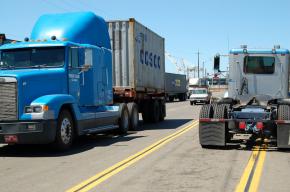Fighting for union rights and clean air
reports on a struggle that has brought together labor and environmental groups to demand cleaner air and union rights.
OAKLAND, Calif.--More than 1,000 workers rallied and marched July 23 to demand "good jobs and clean air." The rally was organized by the Teamsters union, the Alameda County Labor Council and a host of community groups, including the Coalition for Clean and Safe Ports and the East Bay Alliance for a Sustainable Economy.
The rally was held to build support for passing local environmental and work regulations that would improve the lives of both the truckers who work the ports and members of the West Oakland community who live near the ports. It was also part of a bid by the Teamsters to organize the more than 2,000 port truck drivers who are not unionized and operate largely as independent contractors.
The policies pressed by the coalition of labor and community groups are modeled on the Clean Truck Program (CTP) recently passed by the Los Angeles City Council and signed into law by Mayor Antonio Villaraigosa. The CTP will immediately replace 20 percent of the dirtiest trucks (in terms of emissions standards) and put in place a series of incentives and fee exemptions to replace the other 80 percent. Most importantly, the cost of this replacement would be shared by the government and licensed trucking companies, and not fall on the drivers themselves.

The drivers and community members in Oakland are demanding similar changes. The trucking companies profit from $1.7 billion in economic activity that comes through the Port of Oakland every year. They are the ones who should pay for the cleanup.
THE OAKLAND plan attempts to deal with the environmental hazard created by trucks running on idle for hours as they wait in line to pick up their cargo. Yovani Hernandez, an independent trucker who works 14 to 15 hours a day, said he typically spends seven to 10 hours a day waiting with other truckers. The combined exhaust of their trucks creates a hazard for workers who experience "soot levels" about 2,000 times what is considered acceptable by state and federal environmental agencies.
In addition, the West Oakland community near the ports has double the cancer rates of other Bay Area residents, and up to 20 percent of the children of West Oakland suffer from asthma, compared to 5.7 percent nationally.
These horrible conditions have brought together labor and environmental rights groups to demand change that does not burden the truckers, who are already struggling under the weight of sweatshop working conditions, miserable wages and no health benefits.
Further, the plan would roll back some of the deregulation of the ports that occurred during the 1980s and helped produce this mess. It would also require that independent truckers be treated as employees of trucking companies, which would in turn be regulated to enforce environmental, community and labor standards.
Each company would be held responsible for cleaning up its trucks and not permitted to put the burden of the cleanup on the workers themselves. In addition, companies would be required to reduce congestion in residential areas and provide jobs to local residents by employing West Oaklanders in the emissions overhauls required on thousands of Bay Area trucks.
The Teamsters also see this plan as offering a key opportunity to re-unionize an industry that was organized prior to deregulation. The Teamsters are focusing on the low wages paid to truckers--60 percent of truckers make less than $12 per hour, and 25 percent make less than $8 per hour. Also, given the hazardous conditions of the work, the Teamsters are pushing for an employer-based health care plan.
Hernandez describes the bind he finds himself in by working in a "sweatshop on wheels." "When I get home at night, I can feel that I'm struggling to breathe," he said. "I can tell I'm not breathing right. But there's nothing I can do. This is how I make a living."
Efforts to clean up the trucks at the Oakland docks show not only the potential for alliances in fights for a clean environment and a strong labor movement, but also highlight the problem of environmental racism and demonstrate the importance of Black and Brown unity. Most of the Oakland truckers are Latino, and most of the residents of West Oakland are African American.
The struggle for the CTP in LA shows that a living wage and cleaner environment can be fought for and won. Now it is up to the drivers and residents of Oakland and their allies to push for similar gains.


